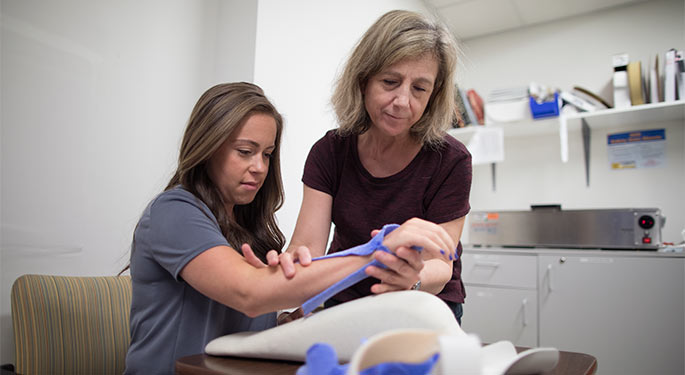Prevention and Wellness Tips

According to the Occupational Safety and Health Administration, musculoskeletal disorders (MSDs) are one of the leading causes for time lost at work. In 2015, the Bureau of Labor Statistics reported MSDs accounted for 31 percent of total cases for workers requiring days away from work.
Some musculoskeletal disorder conditions include:
- Carpal/tarsal tunnel syndrome
- Muscle strain in the neck, shoulder and lower back
- Pinched nerve
- Sprains
- Strains
Our physical and occupational therapy services team provides care for patients affected by work-related musculoskeletal disorders. We explain to our patients that these conditions are not necessarily from a sudden event such as a slip and fall but gradually developed over a period of time. Musculoskeletal disorders often occur as a result of daily physical routines and activities associated with the work environment.
Factors of work-related MSDs include:
- Lack of physical movement
- Performing daily repetitive activities
- Poor body mechanics when bending, lifting, or reaching
- Poor posture at desks and computer work stations
Reduce Your Risk of a Work-related Musculoskeletal Disorders
Our rehabilitation experts offer prevention tips to help you avoid long-term problems related to work-related musculoskeletal conditions:
- Adjust your work area to reduce the amount of reaching and bending you have to do in a day
- Avoid slouching and bending in awkward positions that apply pressure to the neck and back muscles, such as cradling the telephone between your shoulder and ear.
- Incorporate stretching and movement to help strengthen your posture.
- Reduce repetitive or prolonged activities as much as possible.
- Take frequent breaks throughout your day.
- Use the proper mechanics to lift objects by bending at the knees. As an alternative to physical exercise, use equipment used for moving or lifting.
If left untreated for, the risk of long-term injury and chronic pain can increase with age and may require surgery, extensive rehabilitation, and physical therapy.
The Rehabilitation Medicine staff at Mount Sinai is here to help you avoid injuries that might prevent you from enjoying your normal, daily activities and to help you manage any current pain you may already have. We will provide more information and techniques you can use to maintain healthy daily activities as we work with you. Please contact us to make an appointment if you require additional help.
Preventing Traumatic Brain Injury
The Centers for Disease Control (CDC) and New York Department of Health Statistics make it clear that the most effective way to prevent a traumatic brain injury (TBI) is to avoid dangerous situations that can cause harm to the head.
TBIs occur as a result of a force or impact to the head that affects normal brain function. Falls, car collisions, and sports related activities are just some examples of common accidents connected with TBIs. The effects of a TBI can range from mild to severe and may cause temporary to long-term complications.
Brain injury symptoms vary from person to person but may include:
- Communication problems
- Concussion
- Confusion
- Headache
- Loss of consciousness
- Memory problems
Our specialists are available to support you and offer tips to protect you and your family.
Check playground surfaces and equipment
- Avoid concrete, asphalt, blacktop, and other surfaces that do not cushion a child’s fall from playground equipment.
- Choose playgrounds with ‘soft’ surfaces beneath equipment such as mulch filling, sand, or rubber surfacing mats that are designed to cushion falls.
Exercise daily
- Add exercise to your daily routine to improve strength, balance, and coordination.
Fall-proof your home
- Clear clutter, debris, and other potential tripping hazards from stairs, hallways, walkways, and entrances.
- Place safety gates at the top and bottom of stairs to prevent small children from climbing or falling.
- Provide installation of window guards throughout your home.
- Use a step ladder for out-of-reach objects instead of chairs, tables, and unstable household items
- Use non-slip mats in tubs and showers to prevent falls.
Wear protective head gear
- Wear a helmet when riding your bike, motorcycle, or other vehicles that expose you to the risk of head injury.
- While participating in activities such as football, baseball, skateboarding, and snow sports, you should always use a helmet.
Wear your seat belt
- Keep children safe by placing them in appropriate child safety or booster seat.
- Use such a device when you drive or are a passenger in a vehicle.
Mount Sinai offers a variety of services and programs to address the complications of TBI. Our specialized programs including Phase II and the Bridge Program assist persons living with the effects of mild, moderate, and severe brain injuries.
To learn more, please visit our site about brain injury.